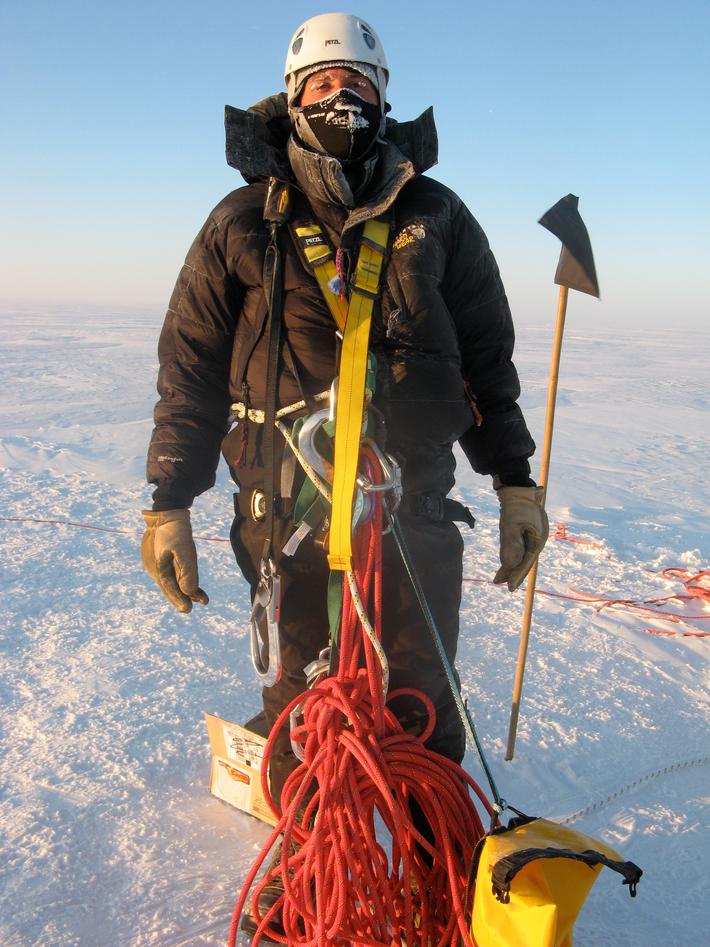New ERC-project aims to change climate research
Climate researcher Hans Christian Steen-Larsen has for many years explored some of the most extreme environments on Earth, in his search to improve our climate models. If he succeeds with his new ERC-project, it will have great impact on todays climate research.

Main content
The SNOWISO-project comes with a «high risk/high gain»-status, meaning that ERC conciders the hypotesis as a risk, but a risk worth taking, considering the solid background of the project leader and the potensial gain if the hypotesis is verified. If the project succeeds, it will give new and exciting perspectives to the field of climate research.
A major question for the five-year run of the project, is if it is possible to analyze so-called isotopes from ice cores to create a better understanding of past climate variations and therefore better climate models.
SNOWISO
Isotopes are, simply put, atoms with a specific composition. The isotopic composition varies, for instance due to temperature, and in this way the isotopes contain an "image" of the climate at a given point in time.
The use of ice core records as climate archives thus mainly relies on the assumption that the state of the climate determines the isotopic composition of precipitation, which is "stored" in ice, and can later be analyzed in ice cores. SNOWISO questions this view, with the hypothesis that the isotope record from an ice core is determined by a combination of the precipitation isotope signal and the atmospheric water vapor isotope signal above the snow surface.
With SNOWISO, Hans Christian Steen-Larsen will look at the processes in the hydrological cycle that influence the isotopic composition of the water, and establish how the water isotope signal is recorded in snow. This will give a more accurate analysis of data from ice cores. In the project, Steen-Larsen and his team will combine laboratory and field experiments with observations of snow and water vapor isotopes in Greenland and Antarctica. They will analyze ice cores from the past, perhaps so far back as 1,5 millions years if the new EU Horizon 2020 project Beyond EPICA - Oldest Ice is successful.
The larger picture
Steen-Larsen for a moment rests his eyes on the world map hanging on a wall of his office at the Geophysical Institute at the Faculty of Mathematics and Natural Sciences, University of Bergen.
"The map reminds me of how small we are as individuals. And how important it is to understand that we need to look further than our own backyard, to understand that our actions affects people and communities on a much larger scale", he says.
He feels climate researchers have a responsibility to enlighten the public and decision-makers about the consequenses of climate change. That is why scientists need the best possible foundation for their research. In his quest to improve our climate models, Steen-Larsen has travelled to many of the most extreme environments on Earth, from Antarctica to Mount Everest. His research has also taken him to Bermuda, to study water vapor.
In Steen-Larsens view, all this is closely linked together.
"I have an holistic approach, and aim to combine climate models with climate research on ice cores", he says, adding:
"When SNOWISO ends in five years, I hope to have built brigdes between the analysis of isotopes in ice cores and climate modeling. To present new ways to understand climate, and climate dynamics".
Cooperation in Bergen
SNOWISO builds on many years of research, but the ERC-project started in 2018. It will last for five years, and Ph.D.-positions will soon be in place at the university.
Steen-Larsen appreciates the strong scientific community on climate research that already exists at the University of Bergen and the Bjerknes Centre.
"Climate research in Bergen is internationally recognized, and I look forward to cooperating with these groups. That is one of the main reasons why I moved SNOWISO to UiB", he says.
The climate researcher looks forward to the challenges that awaits the next five years.
"The most exciting thing with getting an ERC-grant, is the possibility to build a team and investigate these potentially ground breaking questions with them, he says, underlining the word "potentially".
"There is no guarantee that the hypotesis is correct, but if it is, I believe this will be the beginning of something really interesting", he says.
